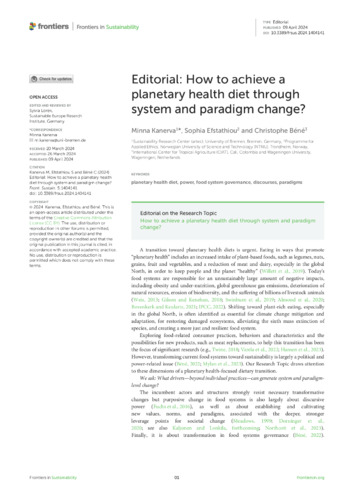Editorial: How to achieve a planetary health diet through system and paradigm change?
A transition toward planetary health diets is urgent. Eating in ways that promote “planetary health” includes an increased intake of plant-based foods, such as legumes, nuts, grains, fruit and vegetables, and a reduction of meat and dairy, especially in the global North, in order to keep people and the planet “healthy” (Willett et al., 2019). Today’s food systems are responsible for an unsustainably large amount of negative impacts, including obesity and under-nutrition, global greenhouse gas emissions, deterioration of natural resources, erosion of biodiversity, and the suffering of billions of livestock animals (Weis, 2013; Gilson and Kenehan, 2018; Swinburn et al., 2019; Almond et al., 2020; Bovenkerk and Keulartz, 2021; IPCC, 2022). Shifting toward plant-rich eating, especially in the global North, is often identified as essential for climate change mitigation and adaptation, for restoring damaged ecosystems, alleviating the sixth mass extinction of
species, and creating a more just and resilient food system.
Exploring food-related consumer practices, behaviors and characteristics and the possibilities for new products, such as meat replacements, to help this transition has been the focus of significant research (e.g., Twine, 2018; Varela et al., 2022; Hansen et al., 2023).
However, transforming current food systems toward sustainability is largely a political and power-related issue (Béné, 2022; Mylan et al., 2023). Our Research Topic draws attention to these dimensions of a planetary health-focused dietary transition.
We ask: What drivers—beyond individual practices—can generate system and paradigm-level change?

